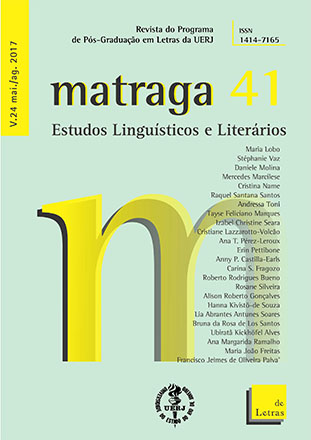Down two steps: Are bilinguals delayed in the acquisition of recursively embedded PPs?
DOI:
https://doi.org/10.12957/matraga.2017.28781Keywords:
language acquisition, recursion, PP modifiers, bilingual delayAbstract
The present study examines whether bilingual children are delayed in the ability to produce complex DPs. We elicited production of DPs containing two PP modifiers, in two conditions designed to tease apart the acquisition of an embedding rule from the acquisition of the recursivity of an embedding rule. In the recursive condition, one modifier PP was itself modified by an additional PP. In the non-recursive condition, both PPs sequentially modified the main noun. Participants were 71 English monolingual children and 35 bilinguals between the ages of four and six. The evidence suggested an overall difference between groups, however further analysis revealed that bilinguals differed from monolinguals only insofar as the onset of PP embedding. No specific additional bilingual delay arose from the recursive condition. This suggests that recursive embedding is a resilient domain in language acquisition and supports proposals that link morphosyntactic delays in bilingual children to domains of grammar that are heavily reliant on lexical learning, which would include learning the first instance of PP embedding.
---
Original in English.
---
DOI: http://dx.doi.org/10.12957/matraga.2017.28781
Downloads
Downloads
Published
How to Cite
Issue
Section
License
Authorization
Matraga – Scientific Journal of the Post-graduate Program in Arts and Humanities of UERJ is authorized to publish the article submitted here, if it is accepted for online publication. It is attested that the contribution is original, that it is not being submitted to another publisher for publication, and that this statement is the expression of truth.
The works published in Matraga's virtual space – Scientific Journal of the Post-graduate Program in Arts and Humanities of UERJ will be automatically transferred, and your copyright is reserved to Matraga. Its reproduction, in whole or in part, is conditional on the citation of the authors and the data of the publication.

Matraga uses license Creative Commons - Attribution-Non-Commercial 4.0 International.





